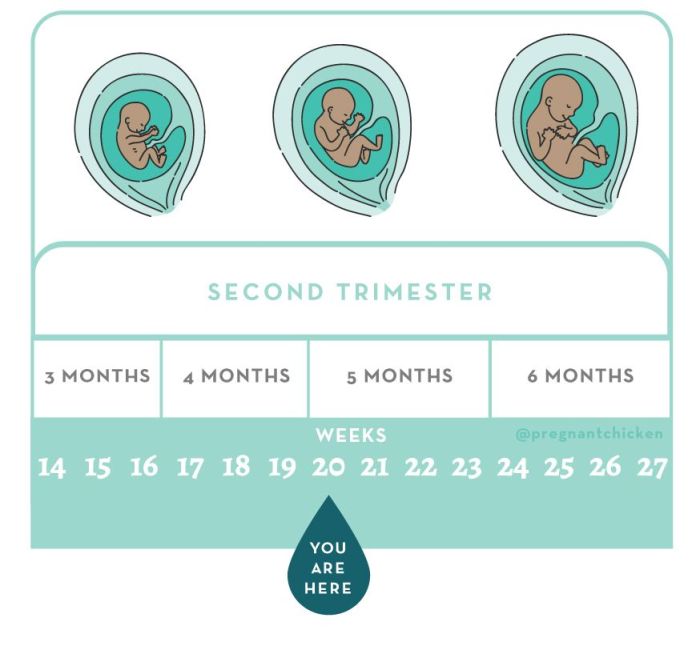By the 20th week of pregnancy emt – By the 20th week of pregnancy, significant milestones in fetal development and maternal health are reached, marking a crucial stage in the pregnancy journey. This guide provides an in-depth exploration of the key changes, common symptoms, and essential preparations during this pivotal period.
As the fetus continues its remarkable growth and organ formation, the mother experiences a range of physical and emotional adjustments. Understanding these changes and seeking appropriate prenatal care are vital for ensuring the well-being of both mother and baby.
By the 20th Week of Pregnancy: Fetal Development

At the 20-week mark of pregnancy, the fetus has undergone significant growth and development. The body systems are beginning to take shape, and the fetus is now about the size of a banana.
Formation of Key Organs and Body Systems
By the 20th week, the fetus’s major organs and body systems are well-formed. The heart is fully developed and beating regularly. The lungs are also developing rapidly, and the fetus is beginning to practice breathing movements. The digestive system is also developing, and the fetus is able to swallow and digest amniotic fluid.
Importance of Prenatal Care and Monitoring
Prenatal care and monitoring are essential at this stage of pregnancy. Regular checkups with a healthcare provider can help ensure that the fetus is developing properly and that the mother is healthy. During these appointments, the healthcare provider will check the fetus’s heart rate and growth, and perform an ultrasound to assess the fetus’s development.
Maternal Health and Well-being: By The 20th Week Of Pregnancy Emt
At 20 weeks, the mother may experience a variety of physical and emotional changes. These changes are caused by the hormonal changes that occur during pregnancy.
Physical Changes
- Increased breast size
- Darkening of the nipples and areolas
- Weight gain
- Enlarged abdomen
- Skin changes, such as stretch marks and darkening of the skin around the nipples
Emotional Changes
- Mood swings
- Fatigue
- Anxiety
- Insomnia
- Increased emotional sensitivity
Importance of Prenatal Appointments and Screenings
Prenatal appointments and screenings are essential for monitoring the mother’s health and the fetus’s development. These appointments provide an opportunity for the healthcare provider to check the mother’s blood pressure, weight, and urine, and to perform a physical exam. The healthcare provider may also recommend additional screenings, such as an ultrasound or blood tests, to assess the fetus’s health.
Common Symptoms and Concerns

Many mothers experience common symptoms at 20 weeks of pregnancy. These symptoms can include:
Fatigue
Fatigue is a common symptom of pregnancy, especially during the first and third trimesters. This fatigue is caused by the hormonal changes that occur during pregnancy, as well as the increased demands on the body.
Back Pain
Back pain is another common symptom of pregnancy. This pain is caused by the increased weight of the uterus, as well as the changes in the mother’s posture.
Heartburn
Heartburn is a burning sensation in the chest that is caused by the reflux of stomach acid into the esophagus. This symptom is common during pregnancy, especially in the third trimester.
Tips for Managing Symptoms
- Get plenty of rest.
- Eat small, frequent meals.
- Avoid lying down after eating.
- Elevate your head and shoulders when sleeping.
- Take over-the-counter antacids to relieve heartburn.
Common Concerns and Fears, By the 20th week of pregnancy emt
Many mothers have common concerns and fears at 20 weeks of pregnancy. These concerns and fears can include:
- The health of the fetus
- The ability to give birth to a healthy baby
- The changes that are happening to the mother’s body
- The financial and emotional costs of having a baby
Addressing Concerns and Fears
It is important to address these concerns and fears with a healthcare provider. The healthcare provider can provide information and support, and can help the mother to develop a plan for a healthy pregnancy and delivery.
Preparing for the Second Trimester

The second trimester of pregnancy begins at 20 weeks and ends at 28 weeks. This trimester is often a time of increased energy and activity for the mother. It is also a time to prepare for the birth of the baby.
Choosing a Healthcare Provider
If you have not already chosen a healthcare provider, now is the time to do so. The healthcare provider will provide prenatal care and deliver your baby. It is important to choose a healthcare provider who you feel comfortable with and who you trust.
Setting Up a Prenatal Care Schedule
Once you have chosen a healthcare provider, you will need to set up a prenatal care schedule. Prenatal care appointments are typically scheduled every four weeks during the second trimester.
Making Lifestyle Changes for a Healthy Pregnancy
There are a number of lifestyle changes that you can make to promote a healthy pregnancy. These changes include:
- Eating a healthy diet
- Getting regular exercise
- Avoiding alcohol and tobacco
- Getting enough sleep
- Managing stress
Tips for a Healthy Pregnancy
In addition to the lifestyle changes listed above, there are a number of other things you can do to maintain a healthy pregnancy at 20 weeks. These include:
Nutrition
- Eat a healthy diet that includes plenty of fruits, vegetables, and whole grains.
- Take a prenatal vitamin.
- Avoid eating raw or undercooked meat, fish, or eggs.
- Limit your intake of caffeine and alcohol.
Exercise
- Get regular exercise, but avoid strenuous activity.
- Choose exercises that are safe for pregnancy, such as walking, swimming, or yoga.
- Listen to your body and stop exercising if you feel pain or discomfort.
Stress Management
- Find healthy ways to manage stress, such as exercise, yoga, or meditation.
- Talk to your healthcare provider about any concerns or worries you have.
- Join a support group for pregnant women.
Avoiding Harmful Substances and Activities
- Avoid smoking and secondhand smoke.
- Avoid drinking alcohol.
- Avoid using illegal drugs.
- Avoid contact with people who are sick.
Frequently Asked Questions
What are the key fetal developments occurring at 20 weeks?
At 20 weeks, the fetus experiences rapid growth, with the formation of key organs and body systems, including the brain, heart, and limbs.
What are some common symptoms experienced by mothers at 20 weeks?
Common symptoms include fatigue, back pain, heartburn, and increased urination.
Why is prenatal care important at this stage?
Prenatal care allows healthcare providers to monitor fetal development, assess maternal health, and provide guidance on nutrition, exercise, and lifestyle adjustments.